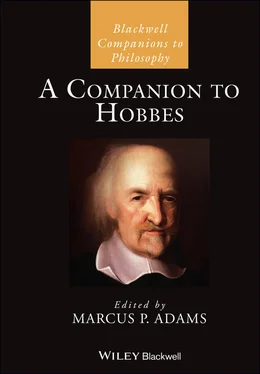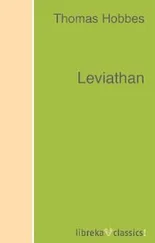13 Hobbes, Thomas. 1839–1845b. Thomæ Hobbes malmesburiensis opera philosophica, 5 vols., edited by Gulielmi Molesworth. London: John Bohn. Cited as OL.
14 Hobbes, Thomas. 1976. Thomas White’s, De Mundo, Examined, translated by Harold Whitmore Jones. London: Bradford University Press. [Anti-White].
15 Hobbes, Thomas. 1991. In Man and Citizen (De Homine and De Cive), edited by Bernard Gert. Indianapolis, IA: Hackett. [De Homine/De Cive].
16 Hobbes, Thomas. 2012. Leviathan: The English and Latin Texts, edited by Noel Malcolm. Oxford: Clarendon Press. [First published 1651.]
17 Holden, Thomas. 2016. “Hobbes on the Function of Evaluative Speech.” The Canadian Journal of Philosophy 46: 123–44.
18 Hull, Gordon. 2006. “Hobbes’s Radical Nominalism.” Epoché 11: 201–23.
19 Hull, Gordon. 2009. Hobbes and the Making of Modern Political Thought. New York: Continuum.
20 Hull, Gordon. 2013. “Meaning.” In The Bloomsbury Companion to Hobbes, edited by Sharon A. Lloyd, 99–103. London: Bloomsbury Academic.
21 Hungerland, Isabel C.and George R. Vick. 1973. “Hobbes’s Theory of Signification.” Journal of the History of Philosophy 11: 459–82.
22 Hungerland, Isabel C.and George R. Vick. 1981. “Hobbes’s Theory of Language, Speech, and Reasoning.” In Introductory Essay to Thomas Hobbes: Computatio, Sive, Logica, edited by Isabel C. Hungerlandand George R. Vick, translated by Aloysius. P. Martinich. New York: Abaris Books.
23 Leijenhorst, Cees. 2002. In The Mechanisation of Aristotelianism: The Late Aristotelian Setting of Thomas Hobbes’ Natural Philosophy, Medieval and Early Modern Science, edited by Johannes M.M.H. Thijssenand Cristoph Lüthy, vol. 3. Leiden: Brill.
24 Malcolm, Noel. 2002. Aspects of Hobbes. Oxford: Clarendon Press.
25 Ott, Walter. 2003. Locke’s Philosophy of Language. Cambridge: Cambridge University Press.
26 Pettit, Philip. 2008. Made with Words: Hobbes on Language, Mind, and Politics. Princeton, NJ: Princeton University Press.
27 Ross, George MacDonald. 1987. “Hobbes’s Two Theories of Meaning.” In The Figural and the Literal: Problems of Language in the History of Science and Philosophy, 1630–1800, edited by Andrew E. Benjamin, Geoffrey N. Cantor, and John R.R. Christie, 31–57. Manchester: Manchester University Press.
28 Sellars, Wilfrid. 1954. “Some Reflections on Language Games.” Philosophy of Science 21: 204–28.
29 Sellars, Wilfrid. 1981. “Mental Events.” Philosophical Studies 39: 325–45.
30 Soles, Deborah Hansen. 1996. Strong Wits and Spiders Webs: A Study in Hobbes’s Philosophy of Language. Aldershot, UK and Brookfield, VT: Avebury.
31 Watkins, John W.N.1973. Hobbes’s System of Ideas: A Study in the Political Significance of Philosophical Theories. 2nd edn. London: Hutchinson.
1 1 Hobbes is self-consciously operating against the backdrop of Scholastic faculty psychology, which he regards as pseudo-explanatory. If there were some cognitive power that could not be explicated as a function of sensation and imagination, this would undercut his argument against the Scholastics, the whole point of which is to establish that it is unnecessary to posit purpose-specific mental faculties to explain different cognitive powers. This comes out clearly in his debate with John Bramhall. For example, Bramhall contends that the non-human animals cannot deliberate because they lack the requisite intellectual faculty; Hobbes retorts that since “it is manifest by continual experience that beasts do deliberate” (EW V.365), deliberation must not be a power of a special intellectual faculty, but an operation of a faculty common to all animals – humans included – namely, sensation and imagination (see also EW IV.242–5; EW V.92–5; EW V.195–7; EW V.363–5; EW V.401).
2 2 For example, in Anti-White, Hobbes claims that an image of running water represents “not that particular water, but any water, or air, or body of the same size and shape” (Hobbes 1976, 53), for it is possible to selectively attend to the surface of the running water and to note the similarity between this and other surfaces.
3 3 This passage indicates an elliptical sense in which words signify things – names in speech signify thoughts and thoughts are mental representations of things.
4 4 See Duncan (2011) for a contrary view.
5 5 Pace Abizadeh (2015), Hobbes does not reject a word-world connection. Since a Hobbesian name does not function as a singular term, there is no threat to Hobbes’s nominalism in allowing that general terms truly apply to objects. A Hobbesian name is a general term. It has an extension and purports to apply to every individual in its extension. Its generality arises from this function; it does not thereby refer to some general thing.
6 6 Some have argued that grounding imposition in similarity vitiates Hobbes’s nominalism (e.g., Pettit 2008, 33–4; Watkins 1973, 104–9). That could be, but Hobbes’s position is just a version of “resemblance nominalism” (Armstrong 1989); if this is a problem, it is a problem for resemblance-based nominalism generally, not Hobbes specifically.
7 7 The geometrical truth would be regarded by Hobbes as necessary and a priori; the claim about tomatoes is contingent. Hobbes discusses his views on the truth conditions of necessary and contingent sentences at De corpore III.10 (EW I.37–8), however, the difference is not relevant to the present argument.
8 8 I have modified the Molesworth English translation.
9 9 See De Jong (1990) for an argument that Hobbes holds a “warranted assertability” theory of truth.
10 10 I have modified the English translation to reflect OL I.12.
11 11 I have not discussed the reason why, on my interpretation, insignificant speech is insignificant. The account should be clear: insignificant speech cannot signify thoughts because it cannot be used to register thoughts, for the names used in insignificant speech lack clear empirical conditions of application (see, e.g., Hobbes 2012, 46; 1651, 11, 2012, 60–2; 1651, 17, 2012, 122; 1651, 39–40; also EW I.29–30).
Конец ознакомительного фрагмента.
Текст предоставлен ООО «ЛитРес».
Прочитайте эту книгу целиком, купив полную легальную версию на ЛитРес.
Безопасно оплатить книгу можно банковской картой Visa, MasterCard, Maestro, со счета мобильного телефона, с платежного терминала, в салоне МТС или Связной, через PayPal, WebMoney, Яндекс.Деньги, QIWI Кошелек, бонусными картами или другим удобным Вам способом.












